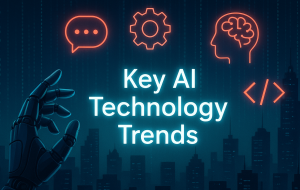The Silent Evolution: How Artificial Intelligence Is Redefining Everyday Life in 2025

Introduction
Artificial Intelligence (AI) is no longer a buzzword confined to tech conferences or science fiction films. In 2025, it has silently but significantly become woven into the fabric of our daily lives. From how we work to how we communicate, shop, receive healthcare, and even experience entertainment—AI is the invisible force powering modern convenience and efficiency. This article explores the latest transformations in AI technology and how these innovations are shaping a new digital age, step by step, without fanfare.
1. AI Has Left the Lab—Now It Lives Among Us
In the early 2010s, AI was mostly experimental, theoretical, or used in niche industrial applications. Fast forward to today, AI tools are built directly into smartphones, operating systems, cars, and kitchen appliances. The AI evolution is no longer about creating superintelligent machines but crafting intelligent, adaptable systems that simplify human life.
Smart assistants, voice-to-text systems, predictive keyboards, and real-time language translators are now AI-driven tools used by millions. The seamlessness of their function is the result of millions of machine learning iterations, allowing AI to act intuitively without users even noticing its presence.
2. Personalized Everything: AI’s Role in Hyper-Customization
From music streaming recommendations to personalized fitness routines, AI has turned the idea of a “one-size-fits-all” model on its head. Algorithms analyze user behavior, preferences, and even biometric data to deliver tailor-made content.
In e-commerce, AI predicts what a customer might want even before they think of it, offering highly specific product suggestions based on browsing habits, location, and past purchases. In 2025, hyper-personalization isn’t just a convenience—it’s a business standard.

3. AI in Healthcare: Predictive, Preventive, and Personalized
Perhaps the most transformative impact AI has had is in healthcare. AI is helping doctors diagnose diseases earlier and more accurately using image recognition tools, pattern detection in patient data, and AI-assisted surgeries.
Moreover, wearable tech integrated with AI can monitor heart rate, blood oxygen, sleep patterns, and other vital signs, providing real-time alerts if anomalies are detected. This shift from reactive to predictive healthcare could potentially save millions of lives by catching conditions before they become critical.
4. The Workplace Has Changed Forever
Remote work, accelerated by the COVID-19 pandemic, opened the door for AI to assist in virtual collaboration and productivity. In 2025, AI handles everything from meeting transcription and action-item generation to smart scheduling and project tracking.
Job automation continues to evolve—not in a dystopian “robots replacing humans” way, but through augmented intelligence. Humans and machines work side by side, with AI handling repetitive tasks and data processing while humans focus on creativity, empathy, and strategic decision-making.
5. Education: AI as a Personal Tutor
AI is revolutionizing education with intelligent tutoring systems that adapt to each student’s learning style and pace. These systems can identify weaknesses, suggest additional resources, and even predict future performance trends.
Virtual classrooms powered by AI tools provide real-time feedback to students and allow teachers to track engagement and progress more efficiently. In under-resourced regions, AI-driven platforms are offering access to quality education where teachers may not be available.
6. Ethical Challenges and the “Black Box” Problem
With great power comes great responsibility. As AI becomes more embedded in society, so do concerns about transparency, bias, and accountability. The “black box” problem—wherein it’s difficult to understand how an AI made a particular decision—remains a significant challenge.
Calls for explainable AI (XAI) are growing, particularly in high-stakes domains like justice, healthcare, and finance. Regulatory bodies in Europe and North America are working to ensure ethical standards and data privacy laws catch up with the rapid pace of AI development.
7. Creative AI: The New Frontier in Art and Media
One of the most exciting developments is AI’s role in creative industries. AI-generated art, music, and even films are gaining recognition. While some see it as a threat to human artists, others view it as a collaborative partner.
Tools like generative AI image editors, AI-assisted music composition software, and natural language writing bots are democratizing creativity. In 2025, you don’t have to be a professional to create compelling content—you just need the right AI tool.
8. AI in Language and Communication
Large Language Models (LLMs), like the ones that power intelligent chatbots, have drastically improved. AI can now hold contextually rich conversations, translate languages with near-human accuracy, and even detect sentiment in communication.
These tools are being used in therapy apps, customer service, and language learning platforms, creating bridges between people who might otherwise face communication barriers.
9. The Future: AI That Understands Emotion?
The next frontier appears to be emotional intelligence. Companies are working on AI that can recognize human emotions through voice, facial expressions, and body language. Such systems could revolutionize mental health support, customer interaction, and even virtual companionship.
But this raises philosophical and ethical questions—can or should machines simulate emotion? And if they do, how do we ensure authenticity and responsibility?
Conclusion
AI in 2025 is not a far-off dream; it’s a deeply integrated part of our lives, often invisible yet immensely powerful. Its presence is subtle, its capabilities vast, and its growth, exponential. As we move further into this AI-powered future, the focus should not only be on what AI can do—but also on how we choose to use it responsibly.
Whether you’re a business owner, student, teacher, creator, or casual internet user, AI is already touching your life in ways you may not even notice. Understanding it, adapting to it, and ethically shaping its future is a shared responsibility we all must take seriously




